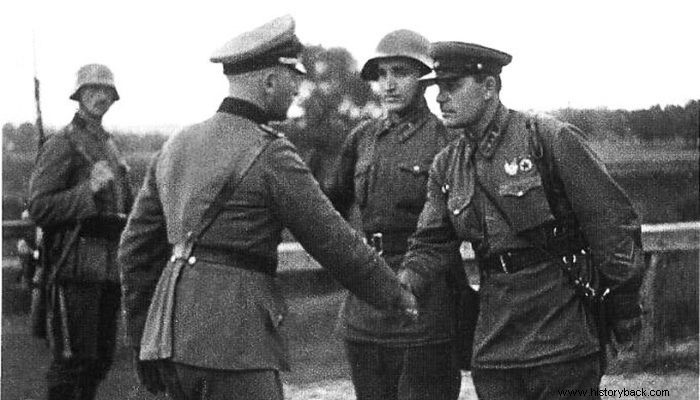
"When I saw the Germans coming from the west and the Russians from the east, I thought that the end of us had come," said Eugene Tchaikovsky, born in 1913, in a report on German public television, when asked to recall what he experienced on September 17, 1939.
At 6 a.m. that day, over 4,000 Soviet tanks invaded Poland. Stalin had sent more aircraft than the German Reich. It was an invasion without a previous declaration of war that marked the beginning of an unequal battle for the Poles, who were already fighting in the west against the Nazis.
Until the Soviet invasion, however, the Poles still had the hope that the war with the Germans would not lead to total destruction, comments Polish historian Zbigniew Wozniacka. September 17, however, was supposed to give the Poles the gratuitous shot.
Hostilities ended with the partition and division of Poland between the Third Reich and the Soviet Union. The wounds of that terrifying period for Poles do not seem to have healed even 80 years later. In the collective memory, such a motley partnership of Nazi Germany with the Soviet Union was recorded as a "betrayal" of the neighbors.
"Symbol of great misery"
"It is often said that the Poles suffered more than the Germans," says historian Zbigniew Wozniacka. But things are not as simple as he says. "For that generation of Poles who lived through the partition, the worst enemy then was not Germany, but Russia. Tsarism, the suppression of rebellions, the conquest of Siberia:with the invasion all these memories were awakened".
September 17 "is a symbol of great unhappiness," explains the historian. And although it soon became clear that this time the Germans too posed a mortal danger, the Nazi atrocity eventually came to an end. On the contrary, Stalin's legacy continues to haunt Poland to this day. Poles are still suspicious of their neighbors. The Polish obsession with the NATO presence confirms the truth of the statement.
Relations with the Russians were not only strained by the invasion of 1939. The murder of thousands of Polish officers and other officials by the KGB's forerunner, the People's Commissariat of Internal Affairs in 1940 in what went down in history as the "Katyn Massacre" and decades of denial from the Russian side created additional deep wounds and widened the gap between the two sides even more. It wasn't until 2009 that Vladimir Putin called the Katyn atrocities "crimes".
The meeting of the Russian president with the then Polish Prime Minister Tusk in Katyn, Smolensk on April 7, 2010 was described by many analysts as "historic". For a moment, it even gave birth to hopes for the reconciliation of the two peoples. It was the first visit of a senior representative of the Russian nation to a place so bloodied by the Stalinist era. But it was also to be the last. Three days later, a plane carrying the then Polish president Kaczynski to Katyn for the commemoration of the victims crashed in Sbolensk, killing all on board.
Conspiracy theories
The accident in Russia's Smolensk has shifted the political coordinates to such an extent that it no longer allows for an objective approach free of sentimentality. The issue has re-poisoned relations with Russia, which has still not handed over pieces of the plane's wreckage to its neighbours, fueling conspiracy theories. Poland's current populist government has not invited Russian President Putin to this year's 80th anniversary of the start of the war on September 1. Justifying the decision, Polish state television simply showed a video of Putin and Tusk embracing 10 years ago.
The non-invitation is indicative of the climate and the insurmountable obstacles facing those who continue to hope for a meaningful rapprochement between Poland and Russia. Relations with Germany, on the contrary, although often strained lately, especially since the Law and Justice party has been in power, are clearly better. The fact that the Germans recognized their responsibilities undoubtedly contributed to this. Unlike the Russian president, Steinmeier's German counterpart was invited to this year's commemorations.
SOURCE:DW
